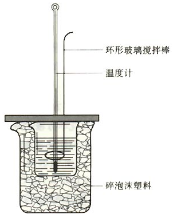问题
问答题
50mL 1.0mol•L-1盐酸与50mL 1.1mol•L-1氢氧化钠溶液在如图装置中进行中和反应,并通过测定反应过程中所放出的热量来计算中和热.试回答下列问题:
(1)大小烧杯间填满碎泡沫塑料的作用:______.
(2)______(填“能”或“不能”)将环形玻璃搅拌棒改为环形金属(如铜)棒;原因是:______.
(3)实验用50mL 1.1mol•L-1氢氧化钠溶液的原因是:______.

答案
(1)中和热测定实验成败的关键是保温工作,大小烧杯之间填满碎泡沫塑料的作用是:减少实验过程中的热量损失,故答案为:减少实验过程中的热量损失;
(2)不能将环形玻璃搅拌棒改为环形金属(如铜)棒,因为环形金属棒是热的良导体,故答案为:不能;因为环形金属棒是热的良导体;
(3)因盐酸易挥发,会导致热量散失,则用过量的氢氧化钠保证盐酸反应完全,以盐酸的量为准进行准确计算,故答案为:要保证盐酸反应完全,以盐酸的量为准进行准确计算.
